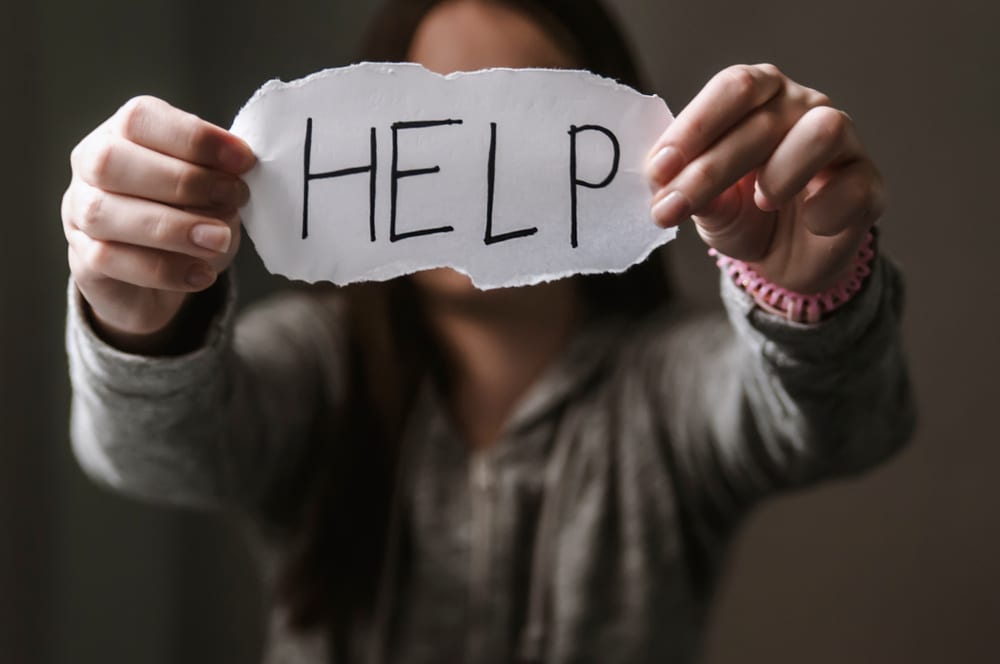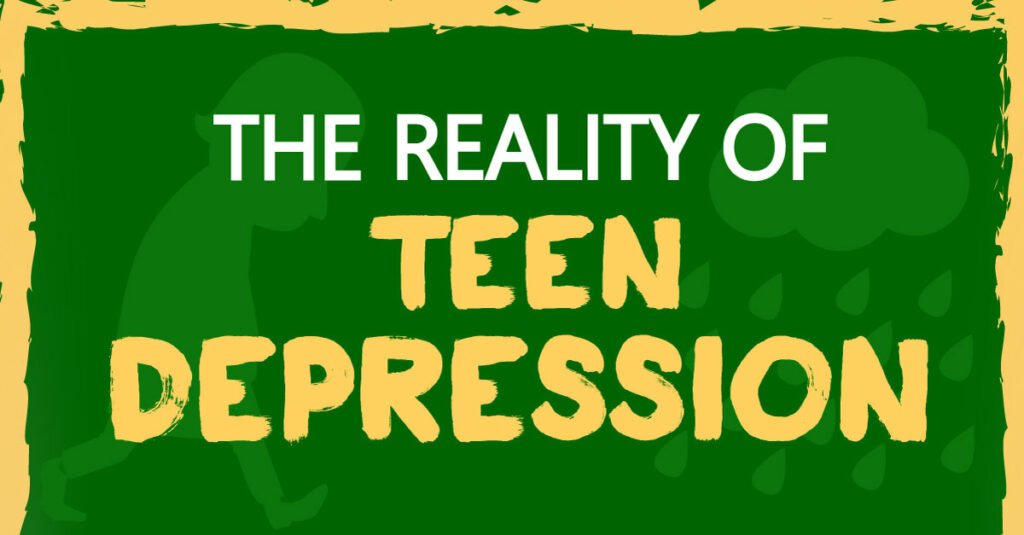Many parents are completely unaware of the mental health struggles their children go through. This is especially true for teenagers who are fighting depression. This blog post will discuss what teenage depression is, how it affects your child, and what you can do to help them get better.
Contents
- 1 What Is Teenage Depression?
- 1.1 How Common Is Teenage Depression?
- 1.2 Is My Teenager Depressed?
- 1.3 Signs And Symptoms Of Teenage Depression
- 1.4 What Are The Suicide Warning Signs In Teenage Depression?
- 1.5 Causes Of Teenage Depression
- 1.6 Tips And Tricks For Teens With Depression
- 1.7 How To Help Teenagers With Depression?
- 1.8 What Are The Consequences Of Untreated Teenage Depression?
- 2 Conclusion
What Is Teenage Depression?

Teenage depression is one of the most common mental disorders that teenagers are likely to have. Although it can affect any type, there are certain risk factors that increase a teenager’s chances of developing this condition. Teenagers who suffer from low self-esteem and other issues like drug addiction or anxiety should be watched closely because they might develop teenage depression if their problem goes untreated.
Depression in teenagers comes from different sources. Sometimes the source is school. Sometimes it’s home or embarrassment about something that happened. Other times its drugs or alcohol, not getting enough sleep, eating too much junk food (especially fast foods), not having enough fruit and vegetables in your diet, or turning to comfort eating when you’re stressed out instead of trying other healthy ways to feel better about yourself again.
Some symptoms are feeling sad, hopeless, and worthless. Depression can happen to anyone, even after losing a loved one. It might make you feel like eating or sleeping differently than before. If you do not like something anymore, it can be hard to concentrate on things that are not important. Depression is a very serious problem. It is estimated that 1 out of 10 teens has depression before they reach adulthood.
How Common Is Teenage Depression?

Oftentimes, teenage depression is thought of as a normal part of growing up. Teenage depression is something that both parents and teenagers have to deal with. It’s important to take care of it because there are a lot of negative effects if the condition is not treated.
Teenage depression is becoming more and more common. According to the National Institute of Mental Health, approximately 17% of teens experience some form of the depressive disorder before they reach adulthood. This number has increased by over 40 percent since 20021. It’s important that parents are aware so they can take steps towards helping their children through this difficult time in life – just because it isn’t visible on the surface doesn’t mean your teen won’t suffer immensely otherwise.
Is My Teenager Depressed?

If you’re worried that your teenager might be depressed, look for these warning signs. Sometimes parents may not notice or pay attention to their teen’s behavior because they feel uncomfortable talking about it.
You need to talk to each other when it is hard. You need to start a discussion about how they are feeling so you can help them cope with difficult times. But don’t worry if they are acting differently. Not everyone feels the same way all of the time.
- Trouble concentrating.
- Lack of motivation.
- Social withdrawal.
- Moodiness/irritability.
- unexplained crying spells.
- They express feelings such as sadness and loneliness that do not go away.
- They feel hopeless about the future.
- Their behavior changes significantly; they seem irritable and more angry than usual.
- They lack interest in activities they once enjoyed and don’t care how they look anymore (eats less).
Signs And Symptoms Of Teenage Depression

The symptoms of teenage depression can be very hard to identify. It is a common misconception that teenagers are moody and temperamental, which causes parents to dismiss the idea that their teenagers may have depressive symptoms or mental illness.
Sometimes it is hard for children and adults to know when they are sad or have a mental illness. They might not think that they are sad because people are usually sad when they break up with friends, school, etc.
Some of the common symptoms are:
- Not wanting to go to school or social events
- Lethargic
- Lacking motivation
- Ability to get good grades
- Not enjoying the things they used to enjoy
- Show a lack of interest in activities such as hanging out with friends,
- Eating too much or too little
- Unhealthy eating habits
- Disruptive Mood Swings
- Persistent Sadness
- Uncontrollable Anger
What Are The Suicide Warning Signs In Teenage Depression?

If you think the teenage depression sufferer is thinking about suicide, or if they are planning to harm themselves in any way it is important that you seek professional help.
If your teen has actually expressed thoughts of harming themselves then this should be taken very seriously and immediate action should be taken. Have a conversation with them straight away as this may allow time for the negative feelings to subside before an actual attempt on their life takes place.
Other warning signs include things like:
- Talking about death
- Giving away treasured possessions
- Withdrawing from friends/family
- Acting recklessly (this could involve drug use)
- Showing no interest in doing usual activities
- Being excessively irritable
Causes Of Teenage Depression

- Bullying: It can be due to peer pressure or any other reason like shaming and name-calling, etc. Parents need to understand this situation and take the best steps accordingly. They should counsel their children in such cases as well as make them feel confident enough so that they stop being a victim.
- Physical disabilities: Due to physical disabilities or mental illnesses such as autism and schizophrenia. These conditions can make you feel bad. You might feel that no one cares about you or that you are really worthless. Teenagers get more depressed when they have problems at school or with their families because their bodies are not ready to handle the stress.
- Lack of social support: Most teenagers prefer to confide in their friends rather than parents. which causes a lack of social support for teenagers and causes depression. In fact, most teenage depression is because o this reason alone.
- Bad Home Environment: One of the biggest causes is a bad home environment, which includes but isn’t limited to poor communication between parents and teens, lack of parental support or attention during times when it’s needed most (i.e., adolescence), drug abuse in the family, etc.
Tips And Tricks For Teens With Depression

There are several tips and tricks when it comes to teenagers with depression.
- It is important for them to know that it will not last forever and there is a light at the end of the tunnel so they can look forward to better days ahead soon enough.
- Depressed teens should also learn how to notice when their symptoms worsen over time so they do not let things get worse than what is already happening in his or her life right now.
- Parents need to help guide them through this process if he or she does not seem prepared enough yet, especially since these feelings are very difficult for anyone who has never experienced such pain before.
How To Help Teenagers With Depression?

Teenagers with depression have it much worse than adults do, mainly because they might not know where to turn for help or how to ask their parents for assistance. When teens feel depressed and alone it’s important that they understand what is happening within them at all times.
If your child needs help from a medical professional who deals with mental health issues, it is important to provide this help. If teenagers receive treatment before it’s too late they may find themselves feeling better and adjusting back into life more easily.
Communicate
- In order to help your child, you must listen carefully and respond thoughtfully. Ask them how they are feeling and what is going on in their life that has been affecting them. –
- It can be hard to tell if your kid is sad or just feels like they’re too ashamed to talk. If you’re not sure, don’t push them. Let them know that you are there for them no matter what.
- It’s important to have open communication with your kids. When they are grown up, you will need to get information from them. You can stop rumors before they start by talking to them now.
- If your child is going through a tough time, they may need to take medication or go for therapy. If they are not comfortable with you helping them out just yet, they may want to find a therapist of their own. But don’t force it unless you think there is immediate danger in the situation.
- If your teen seems hesitant or uninterested in seeking help from professionals, try developing an action plan together so everyone feels involved and no one person has all the responsibility of getting help without some input from another family member.
Encourage Social Connection
- There are a lot of ways to encourage social connection in depressed teenagers. Parents should take time to do things with their teenagers and his or her friends. For example, they can go bowling or to the mall to play video games.
- Sometimes teens who have depression stay inside all the time. They might not feel better when they come outside later.
- It is hard for parents when a child does not want anyone to visit their home while you are away at work. But this is common among teenagers who have depression.
Maintain Physical Health
- Parents will need to make physical health a priority for their depressed teenagers by forcing them to exercise.
- Even if they do not want it, parents should be active with their teenagers in order to assure that they are doing something healthy together at least once or twice per week.
- It is hard for depressed teens when the only thing on their schedule involves sitting around all day and night because this does nothing good for your body too.
Work On Personal Development
- It is very important for parents to work on their teenager’s personal development by encouraging them to start a new hobby or activity that they are interested in.
- Parents can even sign up with their teenagers at the community center so they have an opportunity to meet other people who share similar interests, too.
- When depressed teens feel discouraged because nothing seems interesting enough for them, this makes it nearly impossible for anyone around them to help lift his or her spirits again.
- Parents must try harder if they want depression symptoms among young adults and children to go away completely.
Help Teenagers At Home
- If you want your teenager to feel better, then they need to do something productive during the day.
- This does not mean parents should always push their teenagers to do more and more every day. It is good if they encourage them to do something positive like taking a walk outside on nice days.
- Depressed teenagers who feel lonely can do better when their parents are around because they have someone close to spend time with and not feel judged.
- Parents must be patient with family members when they have depression. It can be hard for everyone to deal with when it happens at important times in life, like when children are starting school or when young adults are about to get married.
What Are The Consequences Of Untreated Teenage Depression?

The consequences of untreated depression can include:
- Relationship problems: This may include breaking up with a partner, friends, or family members which will cause a great impact on your depression. Depression often causes isolation which in turn becomes the cause of other relationship failures.
- Self-harm: Teenagers suffering from severe levels of clinical depression have been known to take extreme measures such as self-harming out of desperation which is to be expected when they are struggling to deal with their emotions.
- Alcohol/drug abuse: Depression often leads to self-medication either by using alcohol, cigarettes, or hard drugs as a way of dealing with emotional pain. Doing something temporarily may not work. It might make the problem worse. For example, you might feel better for a while but then the depression comes back because it hasn’t been fixed.
- Suicide attempts: Some people suffering from untreated major depression become so overwhelmed emotionally that suicide seems like the better option compared to staying alive just feeling miserable every day until eventually there is no more hope for a brighter future.
Conclusion
It is important to be aware of the signs and symptoms that can indicate a teenager may have depression. It is also vital to know how you can help them when they are in need. If your child has been exhibiting any concerning behaviors or if their mood changes suddenly, don’t hesitate to reach out for information about teenage depression and what you should do next.
For more information and Guidance, please contact MantraCare. If you have any queries regarding Online Child Counseling or Teen Counseling experienced therapists at MantraCare can help: Book a trial therapy session


